|
UN
- CLIMATE
CHANGE COP 25 2019, CHILE
CLIMATE
| ELECTRICITY
| RIGHTS
| HYDROGEN
| PLASTIC
| SPACE
| TRANSPORT
| NATIONS
Please
use our A-Z INDEX
to navigate this site, or HOME
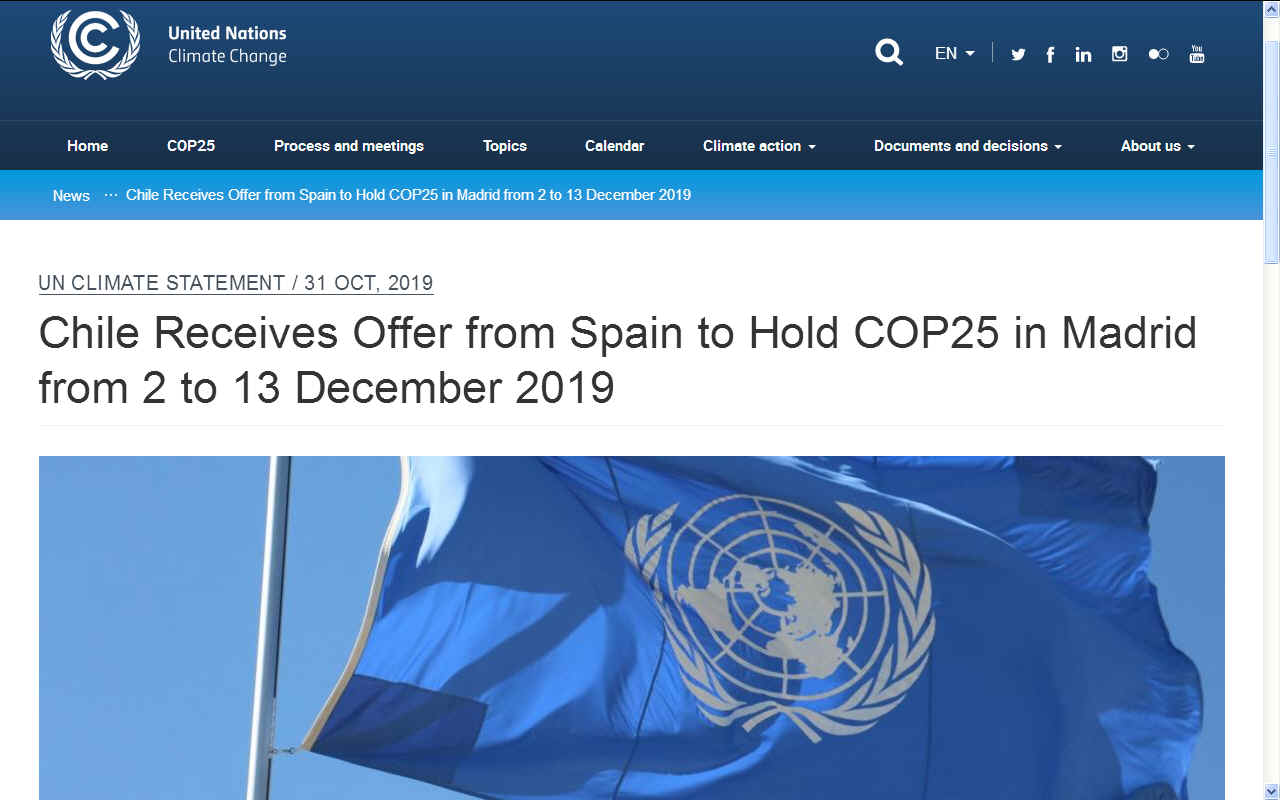
STOP
PRESS: SPANISH OFFER
- Statements by UN Climate Change Executive Secretary Patricia Espinosa:
Update 31 October
2019 - Following yesterday’s announcement, the Government of Chile, as incoming Presidency, has informed me that they received a generous offer of support from the Government of Spain to hold the United Nations Climate Change Conference (COP25) in Madrid on the same dates as originally planned.
We are hopeful that the COP Bureau can consider this proposed solution as soon as possible.
It is encouraging to see countries working together in the spirit of multilateralism to address climate change, the biggest challenge facing this and future generations.
30 Oct 20 19 - Earlier today, I was informed of the decision by the Government of Chile not to host COP25 in view of the difficult situation that the country is undergoing. We are currently exploring alternative hosting options.
UN
SCRAMBLES TO FIND COP25 HOST AFTER CHILE'S SUDDEN PULLOUT -
RIOTS TIMELINE
Uncertainly remains over which country will host the Cop25 climate change conference following the sudden withdrawal of Chile – just a month before delegates from 190 countries were due to gather in Santiago.
The UN indicated that Chilean President Sebastian Pinera – whose country has been beleaguered by weeks of deadly anti-government protests – will remain as head of the conference, due to take place on 2-13 December.
"The UN Framework Convention on Climate Change (UNFCCC) is now trying to see what alternative arrangements can be made," a spokesman for UN Secretary-General Antonio Guterres told journalists.
Conference rules allow the venue to be located outside of the host country, as was the case in 2017 when the German city of Bonn – where the UNFCCC has its headquarters – staged the event for host Fiji.
Germany’s environment secretary tweeted that his government was in contact with last year’s Cop24 host, Poland, while New York and Geneva have also been suggested as potential alternatives.
Pinera said on Thursday that Spain offered to host the Cop 25.
Earlier on, with UNFCCC Executive Secretary Patricia Espinosa conceding it is “difficult to see any country stepping in at short notice”, experts say Bonn appears the most likely fall-back option this year.
“We’re looking at a really big logistical hurdle. If they stick with the December dates, a bunch of people will be booking flights and applying for visas that probably won't be granted in that period of time," says Chris Wright, co-founder of Climate Tracker, a global network of environmental journalists.
“If they delay until January, you have the problem of all these budgets that need to be used up by the end of the year. Either way, it's going to be a tricky one for the hosts and a tricky one for people who want to join.”

HUMAN
RIGHTS
- Protests in Chile began over a hike in subway fares more than a week ago but boiled into riots that have killed at least 17 people, resulted in more than 7,000 arrests and caused more than $1.4 billion of losses to Chilean businesses.
Pinera earlier in the week had declared a state of emergency across much of Chile, placing the military in charge of security in Santiago and other cities and saying the country was “at war” against vandals.
The move sparked outrage among many in Chile, who said his words and actions harkened back to the grim era of military rule under dictator Augusto
Pinochet.
The Cop presidency rotates among Africa, Asia, Latin America and the Caribbean, and Europe. This year is Latin America’s turn. The silver jubilee Cop was first picked up by Brazil, until Jair
Bolsonaro, a climate change sceptic, was elected president and withdrew
Brazil’s candidacy in 2018.
“A lot of people will see this as a real missed opportunity because a Latin American country hosting the Cop brings a brand new element to the diplomacy and to the function of the negotiations,” explains Wright.
“It would have been a really good opportunity for Latin American countries to stand up on climate when their region is going through a very challenging economic time.”
Three Cop conferences in a row will take place in Europe if Bonn steps into the vacancy left by Chile – given that last year’s Cop24 was held in
Katowice, and next year’s event is to take place in Glasgow.
“The biggest impact of holding it in Europe again is that it will limit the participation of civil society members from Latin America – but also from African and Asian countries who will be very challenged to get their visas on time,” Wright says.
Cop25 aims to flesh out how global commitments to reduce emissions this century, made under the 2015 Paris Agreement, will be implemented. Chile’s cancellation comes as US
President Donald Trump is expected to formalise his country’s withdrawal from the deal.
Demonstrations against a hike in metro ticket prices in Chile's capital exploded into violence on October 18, unleashing widening protests over living costs and social inequality.
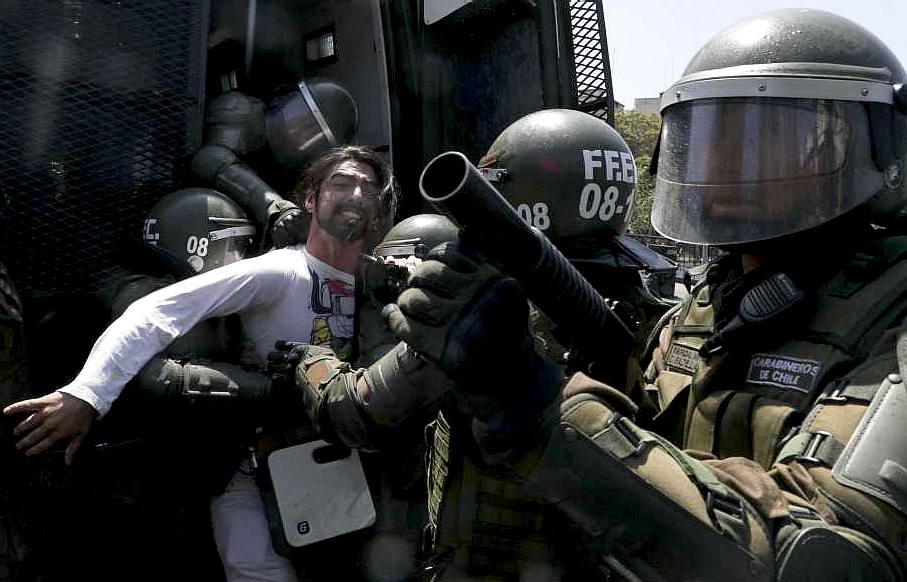
With 19 people killed and thousands of troops deployed, here is a recap of Chile's worst violence in years:
- Subway stations burn -
On October 18 violence breaks out at protests over the price hikes as demonstrators clash with riot police in the capital Santiago.
The violence escalates into the night and several metro stations are hit with Molotov cocktails.
Nearly all the 164 metro stations are attacked and 41 are destroyed, some completely charred. The whole network is shut down.
At least 16 buses are torched. The ENEL power company building and a Banco Chile branch are set on fire.
Around midnight President Sebastian Pinera declares a state of emergency and deploys troops into Santiago.
- Buildings torched -
On October 19 hundreds of soldiers patrol Santiago for the first time since Augusto Pinochet's military dictatorship between 1973-1990.
Thousands of protesters bang pots and pans in the capital. There are also anti-government demonstrations in other cities such as Vina del Mar and Valparaiso.
Hooded demonstrators clash with riot police and soldiers in several areas of Santiago, including outside the presidential palace. More buildings are torched.
Pinera suspends the ticket price hike and calls for dialogue. Authorities announce an overnight curfew in Santiago.
- First deaths -
Unrest continues on October 20 with two women burning to death in the early hours in a blaze.
Police and soldiers tear gas and use water cannons against protesters in the capital, where nearly 10,000 troops and police have been deployed.
Rioters set fire to a garment factory in the city's Renca suburb. Five bodies are recovered.
"We are at war against a powerful, implacable enemy," Pinera tells reporters after an emergency meeting.
Santiago's curfew is extended for a second night and the state of emergency imposed in nine other regions.
- 'Get out military!' -
The next day, thousands of protesters gather peacefully, chanting "Get out military!"
Many of the capital's schools and universities cancel classes, public transport remains heavily disrupted and long lines form at supermarkets and petrol stations.
Pinera says he will meet on October 22 with leaders of Chile's political parties, saying he wants a "social agreement" to address people's grievances.
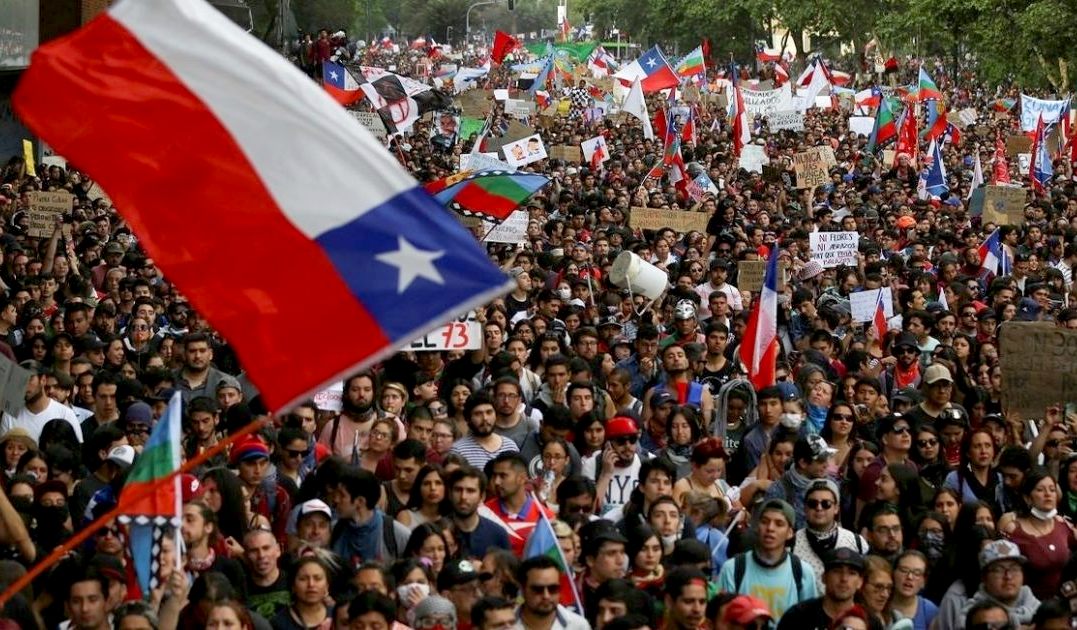
- Social measures rejected -
On October 22 Pinera apologizes to the nation and announces a package of social measures, including increasing the basic pension and freezing tariffs on electricity.
Chileans are unconvinced the main unions and social groups call for a general strike.
On the first day of the strike, on October 23, thousands of people flood the streets of the capital and dozens of other cities demanding the government end the state of emergency.
The country's powerful copper mine workers' unions join the strike
- Chile is the world's largest copper producer - along with health and port workers.
Since the start of the protests 19 people have been killed, another 584 people injured and about 2,410 have been arrested, according to the National Institute for Human Rights.
Some 20,000 police and troops have been deployed.
On October 24, Chile's Foreign Minister Teodoro Ribera says the Asia Pacific Economic Cooperation Summit will go ahead in Santiago in November as planned, despite the week of deadly protests.
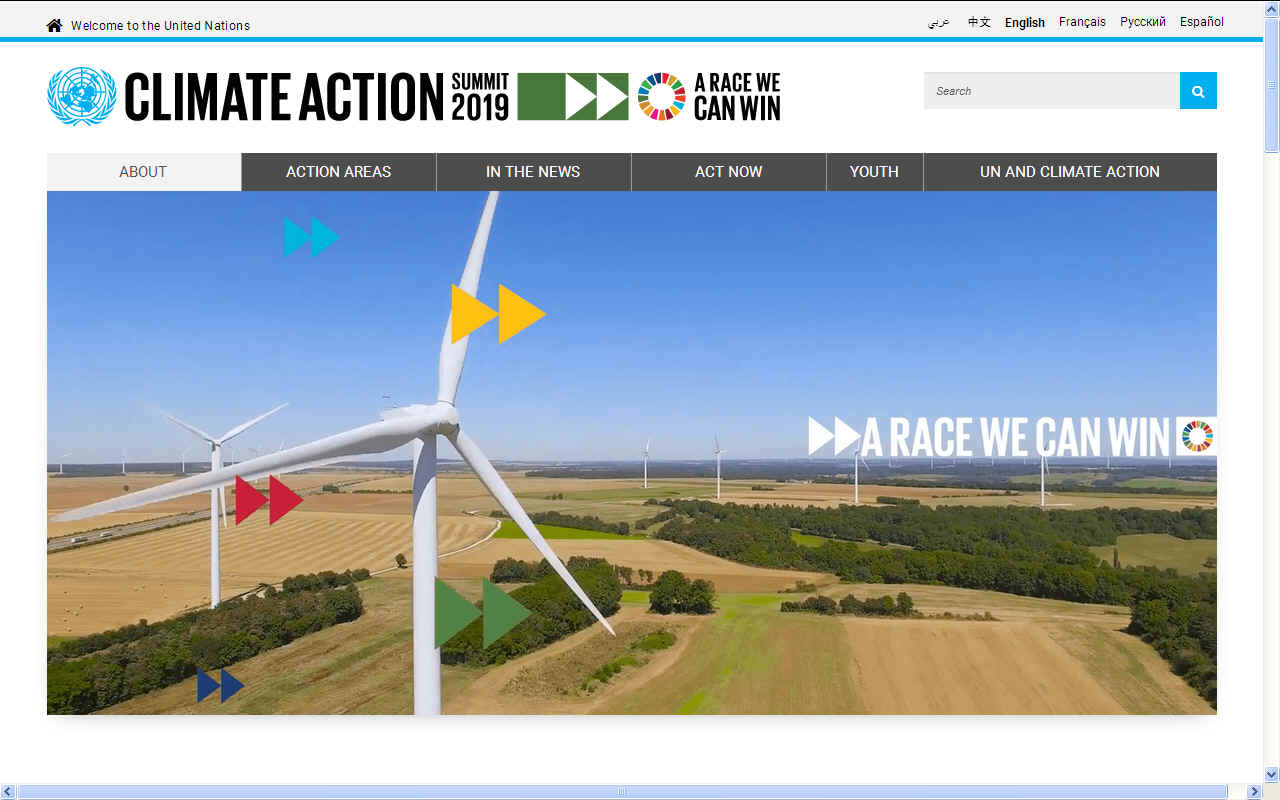
UN CLIMATE ACTION SUMMIT 2019
- "Global emissions are reaching record levels and show no sign of peaking. The last four years were the four hottest on record, and winter temperatures in the Arctic have risen by 3°C since 1990. Sea levels are rising, coral reefs are dying, and we are starting to see the life-threatening impact of climate change on health, through air pollution, heatwaves and risks to food security.
The impacts of climate change are being felt everywhere and are having very real consequences on people’s lives. Climate change is disrupting national economies, costing us dearly today and even more tomorrow. But there is a growing recognition that affordable, scalable solutions are available now that will enable us all to leapfrog to cleaner, more resilient economies.
World leaders need to declare a state of climate emergency
locally, like
the UK.
The latest analysis shows that if we act now, we can reduce carbon emissions within 12 years and hold the increase in the global average temperature to well below 2°C and even, as asked by the latest science, to 1.5°C above pre-industrial levels.
Thankfully, we have the Paris Agreement – a visionary, viable, forward-looking policy framework that sets out exactly what needs to be done to stop climate disruption and reverse its impact. But the agreement itself is meaningless without ambitious action.
UN Secretary-General António Guterres is calling on all leaders to come to New York on 23 September with concrete, realistic plans to enhance their nationally determined contributions by 2020, in line with reducing greenhouse gas emissions by 45 per cent over the next decade, and to net zero emissions by 2050."
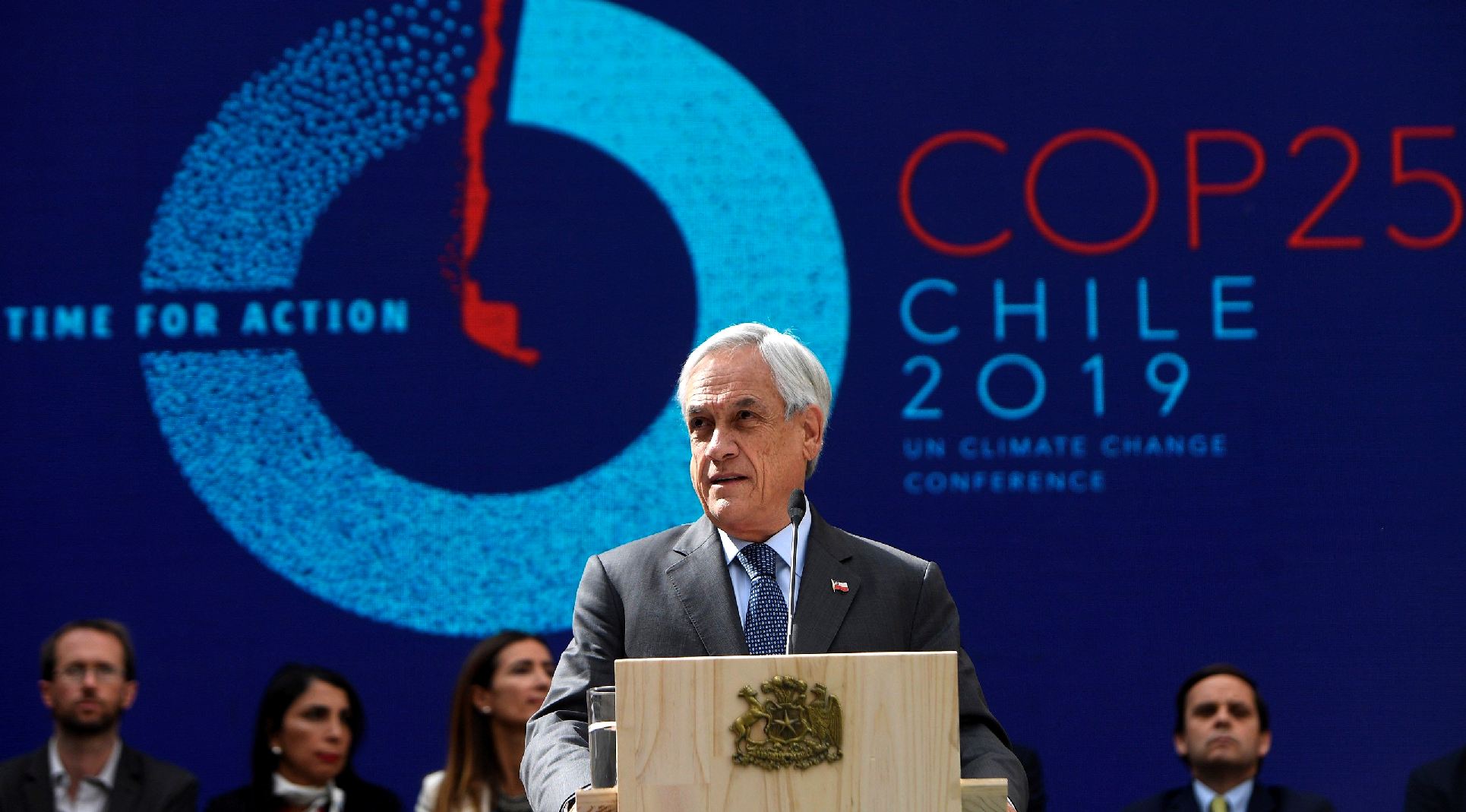
TIME
FOR ACTION - La Presidencia de Chile, Sebastián Piñera. Chile presentó de forma oficial este jueves la Cumbre del cambio climático (COP25), que se celebrará en diciembre próximo, en un acto en el que la ministra chilena Carolina Schmidtz pidió trabajar juntos de la acción climática porque es #TiempoDeActuar.
OUR
(SUGGESTED) SIX
STEPS TOWARD A COOLER PLANET
1.
TRANSPORT:
Phase out polluting
vehicles. Governments aim to end the sale of new petrol, and
diesel vehicles by
2040 but have no infrastructure plan to support such
ambition. Such infrastructure should exceed the performance of
fossil
fuel filling stations, prolong EV
battery life and provide power grids with a measure of load leveling.
Any such system should seek to obviate the provision of
millions of fast charge points where implementation could
prove to be a logistical nightmare and an inefficient energy
delivery system. This may involve
international agreement as to energy storage format and
statute to steer car makers to collaborate (in part) in a world
of competition.

CLIMATE
BUSTER - This solar and wind powered Cross
Channel ferry (concept) is a budget zero carbon design
that could be scaled up to replace bunker
and LNG
fueled ships from 2030, to help operators meet IMO targets.
Being medium range vessels, ferries are the logical choice for
development, leading to longer range cargo and passenger ships
from 2040. It is important to give fleet operators clear
policy steer to avoid costly investment in the wrong
technology during phased changeover to keep them profitable.
Eventually, oil tankers will be relics of the past. This
research is also the subject of a Horizon
Proposal for January 2020 aimed
at longer distance cruising.
ZERO
CARBON CONTAINER VESSEL
- A prototype 50 meter container ship with 6 TEU standard
containers shown in red rust inhibitor paint. They can be
loaded from the rear if overhead loading is not available. If this vessel performs as expected, the age of
zero carbon shipping is getting closer. H2020 Calls for
proposals are looking for solar or wind assisted projects,
rather than zero carbon concepts. There is no reason why a
part of the solar or wind rig might not be retro-fitted to an
existing diesel cargo ship.
The
turbines can be raised and lowered to cope with different
running conditions as seen on the end view left. The main hull
is cylindrical for minimum wetted area, while the outriggers
provide stability, with a small wetted area for a low drag
hull. The superstructure is low to reduce frontal area and air
drag. Another important feature of this design is that the
turbines may be furled for safe docking in ports or during
storm conditions. Please note that these drawings are Design
Copyright © October 17&19 2019, Bluebird
Marine Systems Ltd and Cleaner Ocean Foundation Ltd.

SUSTAINABLE
CONTAINER SHIPPING
- This is a 50 meter solar and wind powered prototype
container transport shown with the turbines furled, as if
docked in port. When folded down like this the blades do not
revolve and may be locked. By this means ports do not have to
make special provision for zero
emission ships.
The
concept may be doubled and quadrupled without too much
trouble. You'd need to up-scale by a factor of 8 to match the
400 meter giants that operate today to carry 960
standard containers. That is nowhere near the capacity of
a heavy
bunker fueled behemoth, but it is a formula for zero
carbon transportation that is theoretically
workable. We believe that such a system could replace diesel
fuels and eliminate the need for liquid fuels that may be
potentially dangerous.
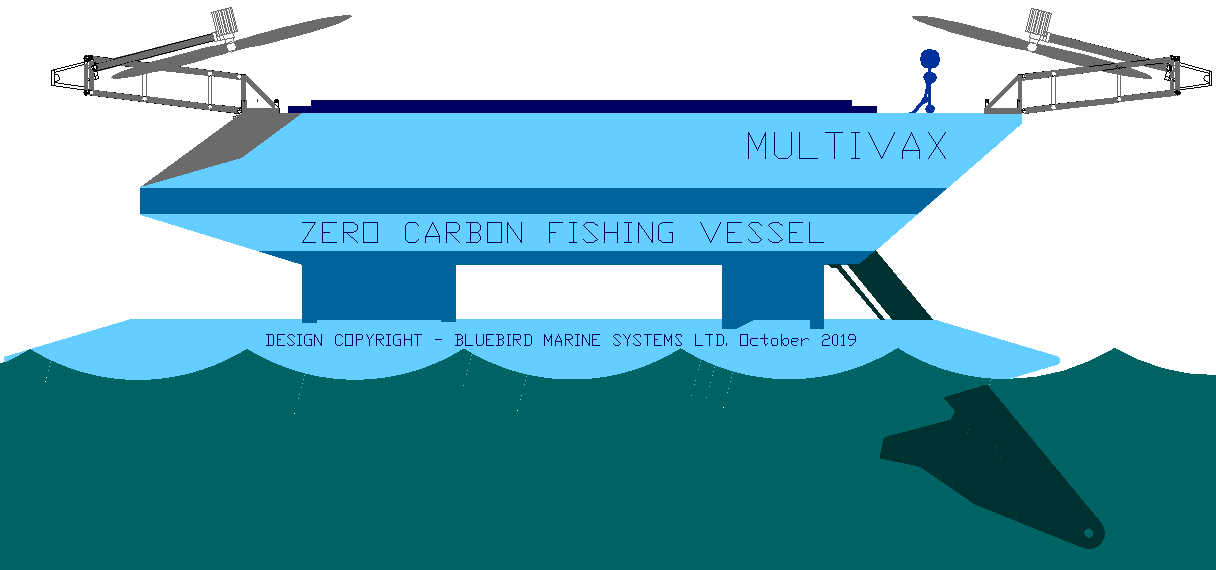
16M
ZERO CARBON FISHING VESSELS - This is a 20 ton fishing
vessel derived from the SeaVax
concept that uses no plastic nets and is powered by the wind
and sun. The wind generators and solar arrays are shown safely
folded and locked for docking in harbour. Copyright ©
diagrams October 24 2019. All rights reserved, Cleaner Ocean
Foundation Ltd and Bluebird Marine Systems Ltd.
Marine transport can be
carbon
neutral given the right policies, with phased transition
in specific stages such as not to unduly penalize present
investment in LNG
shipping and other recent MARPOL
compliant IC
powered vessels. Future cargo vessel should be at least in
part powered by renewable energy, on the road to zero
carbon, making allowances for technology catch-up from 2030
with scrappage
trade in on outdated ships and marine
taxes on internal
combustion engines. It is important that taxes collected
may not be used for any other purpose by any participating
country. In the UK taxes are collected for one purpose then
used for another leading to deficits. E.g. just 5% of road
taxes is used for roads. This is a recipe for bankruptcy and
huge national debt. Such practices should stop in the
interests of sustainability and transparency for the
electorate.
Air
travel powered by kerosene should attract hefty mitigation
offset, where low carbon alternatives should be encouraged.
2.
RENEWABLES:
Renewable energy should replace carbon-based fuels (coal,
oil and
gas) in our
electricity for homes, factories, heating and transport. Coal
and nuclear
power plants should be phased out.
3.
HOUSING: On site micro or macro
generation is the best option, starting with new build homes
that are both affordable and sustainable by design to replace
crumbling housing stocks. Encourage building in timber
to provide carbon lock from a renewable natural resource. Make
sustainable housing a permitted development. Taking out the
need to apply for planning permission, will cut out council
blockers from the decision making process, to stamp out empire
building agendas.
4.
AGRICULTURE: We need
to grow many more trees to absorb
carbon emissions from a growing
population, air travel, and to build new homes. We must
control illegal slash
and burn forest clearances and crack down on offenders. We should
promote reductions in food waste and eating of foods that use
less energy to produce. Educating children on these matters in
schools and via campaigns such as no meat
Mondays, should be part of ordinary study.
5.
INDUSTRY: Factories should be aiming for solar heating and
onsite renewable energy generation.
EV parking and even service facilities should be part of new industrial
estates as part of any building permissions.
6.
POLITICS: - National governing bodies need to adopt
rules to eliminate administrative wastages, to include scaling
down spending on war machines, increasing spend on educating the public and supporting sustainable
social policies that mesh with other cultures. This includes
fostering policies and making funds available to close links
in the technology chain to make up for lost time. Kleptocratic
empire building must cease in the search for natural
equilibrium. Taxes should be used only for the stated purpose.
Borrowing that increases national debts and GHGs in the
repaying must cease.
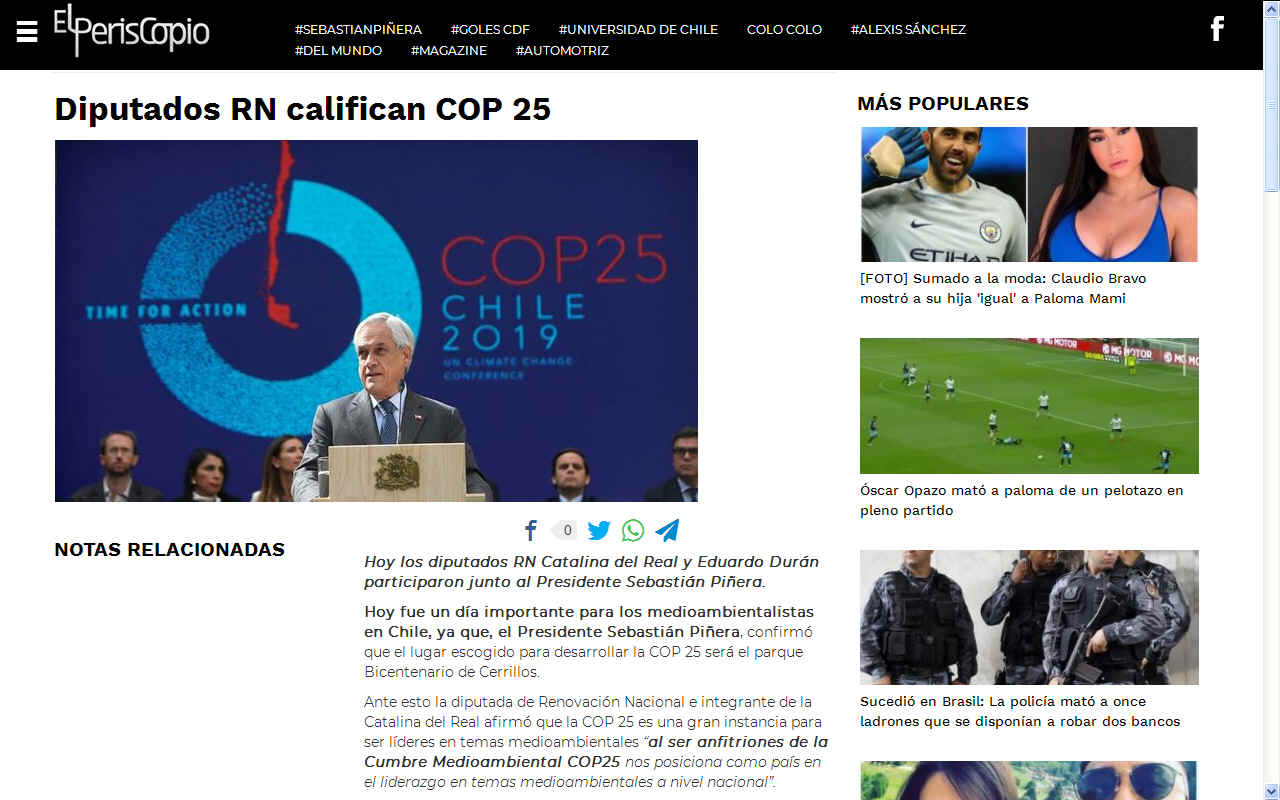
NOTAS RELACIONADAS
- Hoy los diputados RN Catalina del Real y Eduardo Durán participaron junto al Presidente Sebastián Piñera.
Hoy fue un día importante para los medioambientalistas en Chile, ya que, el Presidente Sebastián Piñera, confirmó que el lugar escogido para desarrollar la COP 25 será el parque Bicentenario de Cerrillos.
Ante esto la diputada de Renovación Nacional e integrante de la Catalina del Real afirmó que la COP 25 es una gran instancia para ser líderes en temas medioambientales “al ser anfitriones de la Cumbre Medioambiental COP25 nos posiciona como país en el liderazgo en temas medioambientales a nivel nacional”.
También entregó un mensaje entorno a la importancia del cuidado del planeta “Nuestro planeta ha elevado su temperatura en dos y tres grados en el último tiempo, más del 90% de las especies de la flora y fauna se han ido extinguiendo, somos la última generación que podemos hacer algo para revertir el cambió global. Cuidemos nuestro planeta es el único que tenemos”.
Por su parte el diputado Eduardo Durán, presidente de la Bancada Transversal de Emergencias, Desastres Naturales y Efectos del Cambio Climático, afirmó que “el cambio climático es una realidad que nos afecta enormemente. Y no podemos ser indiferentes con nuestro planeta y las futuras generaciones. La cop 25 en Chile nos da la oportunidad de reafirmar nuestro compromiso con el medio ambiente, con responsabilidad y decisión”.
Al finalizar el diputado Durán depositó sus esperanzas en la COP25 “espero que esa cita mundial sirva para que en Chile tengamos definitivamente una ley de cambio climático que restrinja todo tipo de actividad que fomente el uso de combustibles fosiles y contaminantes y que promueva el respeto y cuidado de nuestro medio ambiente”.
Hoy el gobierno y la Ministra de Medio Ambiente Carolina Schmidt tuvieron el primer acercamiento con el empresariado para solicitar la colaboración de ellos en tan importante evento.
2019: COP 25/CMP 15/CMA 4 TBA
The next summit was expected to take place between November 11 and 22, 2019, but Chilean President Sebastian Piñera now says COP25
is more likely to be held in January 2020.
President Piñera told the press: “We will have the great responsibility of leading and advancing toward a better control of
climate change and global
warming.”
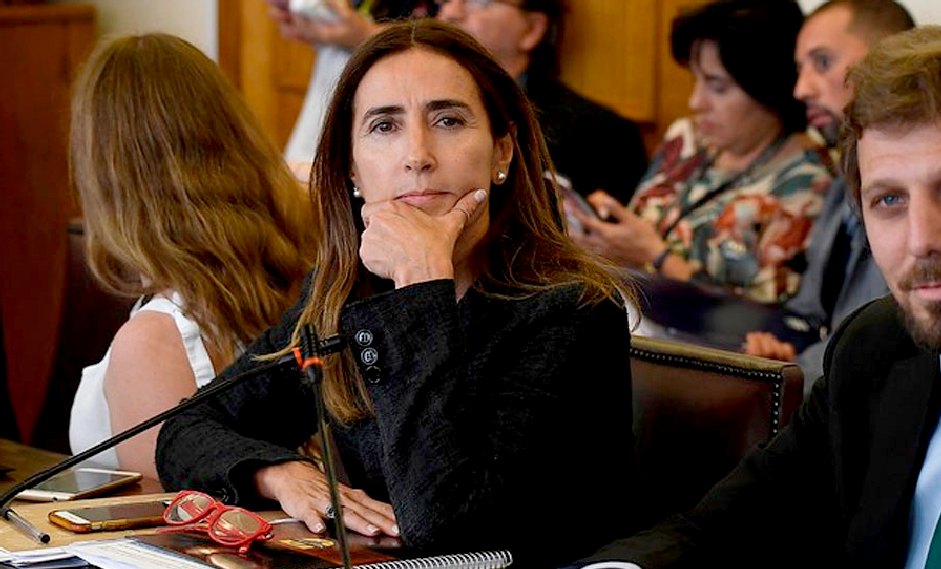
ENGINEER
- Environment Minister, Carolina Schmidt, is a Commercial
Engineer graduated at Chile’s Pontificia Universidad Católica.
During President Sebastián Piñera first period (2010 –
2014), she served as Minister of the National Women’s
Service and Minister of Education. In August 2018, she became
Minister of Environment with a clear purpose: the only way to
achieve sustainable development is with care and respect for
the environment.
She has a cross-cutting message: climate action and economic
development do not move along separate tracks; on the
contrary, it implies that the way to achieve a real
sustainable development is the protection of the environment;
in order to achieve this, adaptation and mitigation to climate
change are essential. One of her priorities is the
incorporation of the gender perspective into public policies
on environmental matters. She has pursued this initiative at
the regional level, at the last Forum of Ministers of
Environment of Latin America and the Caribbean; and at the
global level, at COP24 in the United Nations Framework
Convention on Climate Change.
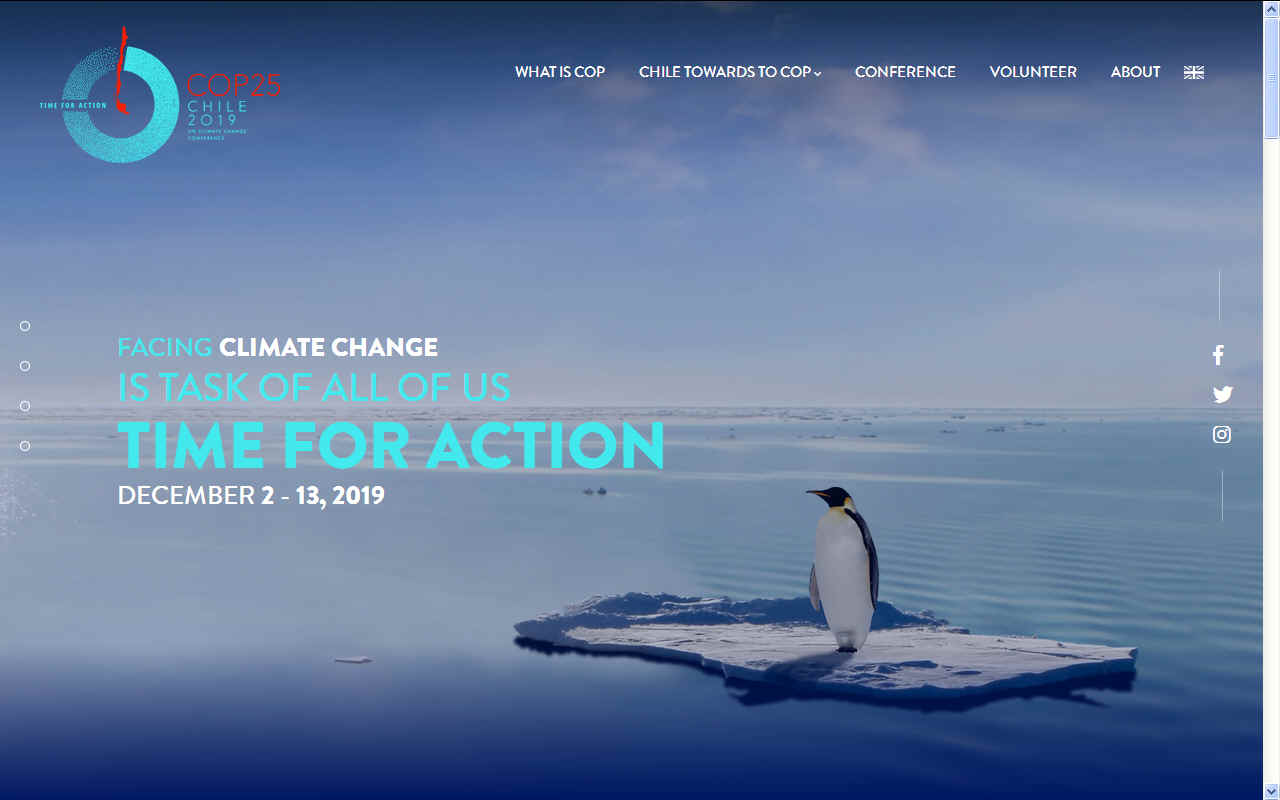
TIME
FOR ACTION! - The COP decided at its 24th session that COP 25 will take place in Chile and requested the Bureau to decide on the dates of the sessions.
The Bureau met on 7 March 2019 and decided that COP 25 / CMP 15 / CMA 2 will take place from 2 to 13 December 2019. The
pre-sessional period will be from 26 November to 1 December 2019.
COP 25 / CMP 15 / CMA 2 will be organized at Parque Bicentenario Cerrillos (ex aeropuerto de Santiago) in Santiago de Chile.
INITIATIVES
While the COP25 is known as the “Time for Action” COP due
to the need for all countries to expand their commitments to
limit global warming, Chile wants to highlight the following
topics.
Oceans
Oceans play a fundamental role in mitigating climate change
since they capture and store more than 90% of the heat and
approximately 25% of the carbon produced by emissions from
human activities. Unfortunately, the increase in heat and
carbon in the ocean is having visible, global impacts, and to
a large extent, irreversible, such as the increase in
temperature, sea level rise, ocean
acidification and changes in marine biodiversity, among
others.
Antarctica
Antarctica, the Arctic and mountain glaciers (cryosphere),
besides being major water reserves, are important climate
regulators since they reflect the solar energy back into space
and thus affecting the planet’s energy balance. The
cryosphere is also very sensitive to global
warming, which leads to melting and loss of mass,
processes that are (in part) responsible for rising sea
levels, loss of biodiversity and deterioration of ecosystems.
Alterations occurring in Antarctica (due to climate change)
will have global consequences and will last for several
centuries.
Biodiversity
The direct and indirect effects of climate change are closely
related to changes in biodiversity resulting from human
activity, so it is essential to ensure the preservation of
biodiversity and its functions and allow for our development
as a society. Biodiversity
is fundamental for the adaptation and mitigation of climate
change, which is why it is necessary to carry out actions that
enable its preservation.
In this context, Chile has not fallen behind; it has a wide
network of land and marine protected areas and is carrying out
a National Plan for Wetlands Protection and working on a Draft
Bill for the creation of the Biodiversity and Protected Areas
Service (SBAP).
Forests
Forests deserve special mention, as they play an important
role in mitigating climate change by capturing and
sequestering CO2
emitted into the atmosphere. In addition, they provide a
number of benefits, such as water provision, protection of
soil and biodiversity in general. Chile boasts an extensive
network of well-preserved native forest ecosystems, especially
in the Patagonian zone. Nonetheless, in other parts of the
country these ecosystems have been significantly altered and
therefore their restoration must be a priority to mitigate
climate change.
Adaptation
Estimations from climate change scenarios for Chile include
increasing temperature, decreasing rainfall in the
center-south and possible increases in farthest areas, and
changes in glaciers surface area. These scenarios imply
increasing extreme weather events and decreasing water
availability, having significant impact on ecosystems,
population and productive activities. In order to cope with
this impact, adaptation measures are required across sectors.
The implementation of these measures must be focused on
institutional improvements, design of resilient
infrastructure, protection of ecosystems and less vulnerable
communities.
Cities
The world is facing an unprecedented process of urbanization,
which in Chile is particularly evident, with 90% of Chileans
living in cities. The large size of cities makes them
extremely complex, but trends of weak sustainability are seen
in medium-sized and small settlements as well.
Cities contribute to climate change through the use of energy
for transport, construction, housing operations and production
processes, and are therefore vulnerable to the impacts of
climate change.
On the other hand, local mitigation actions by the cities have
the potential for an immediate impact which, when added
together, can create global effects and local co-benefits such
as reduced air
pollution.
With regard to adaptation, it is key for local and regional
governments to integrate climate risks into their urban
planning and management processes, in conjunction with the
general public and service companies.
Renewable energies
Renewable energies are of the utmost importance for achieving
sustainable development and for Chile’s ambition to be
carbon neutral by mid-century, as they do not generate direct greenhouse
gases emissions (unlike fossil
fuels).
Chile has accomplished a rapid conversion to renewable
energies without the need for direct subsidies. In fact, Chile
leads Bloomberg’s Climatescope 2018 ranking as the most
attractive country for the development of clean energies (out
of a total of 103 emerging markets). Despite this, we are
currently tapping only about 12 GW of our renewable energy
potential, which exceeds 1,800 GW
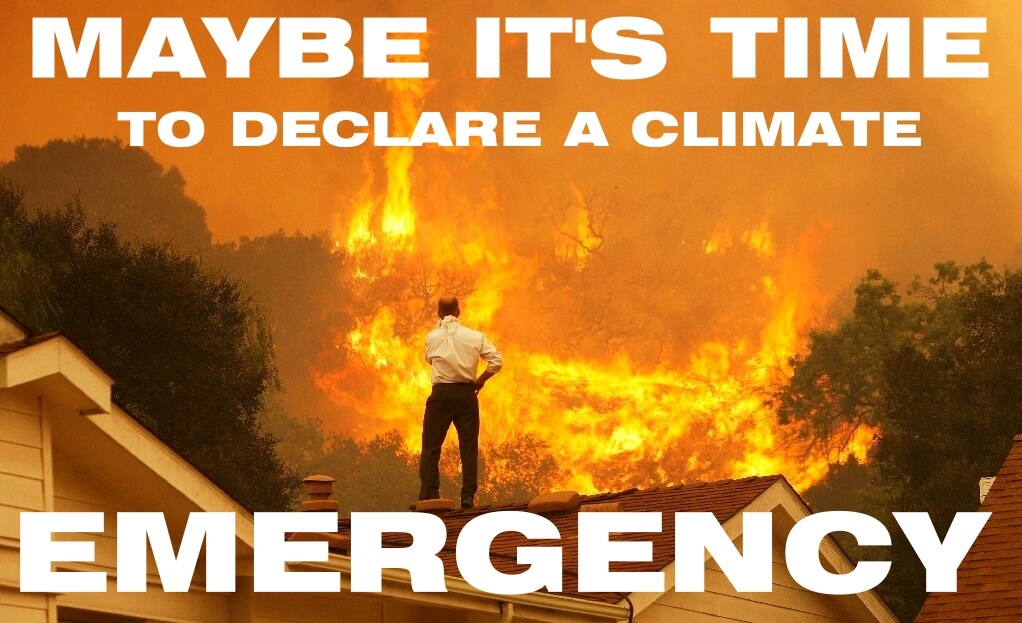
Circular Economy
The fundamental principle of the circular economy is using
waste as raw material for other products, drastically reducing
both waste generation and the extraction of new and raw
materials.
In February 2019, Chile passed a law banning the commercial
use of plastic
bags throughout the country. In addition, in 2016 the
waste management framework law was passed, as well as extended
producer responsibility and the promotion of recycling.
The country has a seal of circularity and initiatives aimed at
reducing the use of plastic are being developed, such as the
“Goodbye plastic
straws” campaign.
Electromobility
Mobility in cities is a major source of greenhouse gases
emissions, as well as many other externalities. To reduce
them, we must think about urban planning aiming at shorter
distances, prioritizing non-motorized modes and promoting
public transport.
With regard to the latter point, electromobility
represents a great opportunity if it goes along with renewable
power generation. And it is especially attractive if the
effort is focused on buses and urban trains. Santiago is
moving forward decisively in this direction, extending its
Metro network and implementing the world’s largest fleet of
electric buses outside China.
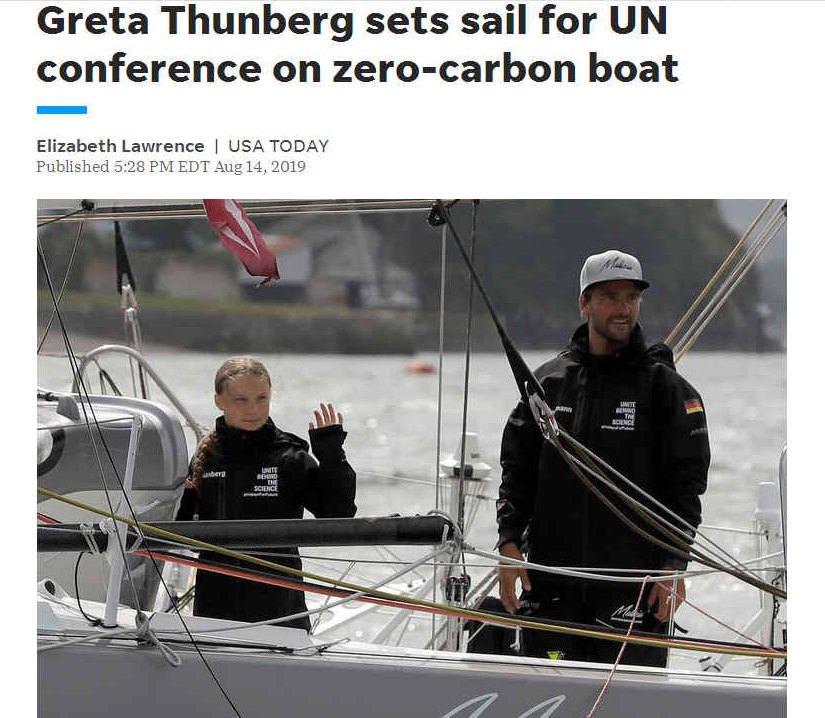
USA
TODAY 14 AUGUST 2019 - Climate
change activist Greta
Thunberg sets sail for New York in
the 60ft Malizia II yacht from Mayflower Marina, on August 14,
2019 in Plymouth,
England. The Swedish activist Greta
Thunberg began her journey to the
United States today for the United
Nations Climate
Conference. Her mode of
travel is fitting for someone who’s climate conscious:
She’s arriving in an eco-friendly boat propelled by the
wind, with solar panels and wind turbines to power the
navigation
instruments and other boat equipment.
VENUE
The Cerrillos Bicentennial Park has approximately 30 gross hectares + 10 net hectares for a capacity of 25,000 people. This site is the former international airport of Santiago and has tremendous potential: Excellent connectivity, location and size to have a World Class Event Center.
The Venue of COP25 will guide visitors to the heart of the summit, taking the official delegates to the Blue Zone and the rest of the public to the Green Zone.
• Blue zone: area of the conference where the negotiations take place
• Green zone: area in which activities parallel to the conference take place, different from the negotiation processes
In this last sector, Chileans will participate in this unique citizen event thanks to the public-private partnership, to show the country's innovation and commitment to climate change.
TRANSPORT
Airport:
The Santiago Arturo Merino Benitez / Nuevo Pudahuel International Airport is 20 minutes from downtown capital.
More info:
www.nuevopudahuel.cl
Public transport:
The RED, The Metropolitan Mobility Network, the public transportation system of Santiago, integrates fares to the buses, the Metro and the MetroTren Nos, facilitating the trips of the attendees. These three modes are paid through a single means of payment: the card beep!
More info: www.red.cl For more information about the Santiago Metro, enter here
www.metro.cl

STRAITS
TIMES DECEMBER 5 2018 - Climate crusading schoolgirl Greta
Thunberg pleads next generation's case -
KATOWICE (AFP) - By the time 15-year-old Greta Thunberg is 45,
tens of millions of people are expected to have fled their
homes as climate
change unleashes a maelstrom of extreme weather, crop
failures and devastating forest fires.
Although it is her parent's generation and those before who
have made climate change possible, it is the billions of young
people like her who will bear its brunt. And she has had
enough.
"It's us who are going to live in this world. If I live
to be 100 I will be alive in 2103 and that is a long time in
the future," she told AFP at the COP24 climate talks.
"We will have to live with the mess that older
generations have made. We will have to clean it up for them.
That is not fair."
Greta has become a leading name in the growing campaign from
youth across the planet, pleading to lawmakers and
corporations to slash greenhouse gas emissions and avert
runaway global warming. Officials from nearly 200 nations are at a UN climate summit
in Poland trying to agree on a rulebook that will make good on
the pledges they made under the 2015 Paris
agreement.
That treaty aims to limit global temperature rises to well
below 2 deg C and beneath the safer threshold of 1.5 deg C if
at all possible.
But with just 1 deg C of warming so far, Earth is already
being buffeted by superstorms, droughts and flooding made
worse by rising seas. And the World Bank has warned that if action is not taken by
world governments, 143 million "climate migrants"
will be displaced by 2050.
Greta and her actor father Svante are at the COP24 talks in
the Polish mining city of Katowice to call on lawmakers to act
now for the good of future
generations. And they want everyone else to do their bit.
After learning about the impacts of people's carbon emissions,
Greta insisted that her family become vegan and give up
flying.
"For me none of this is sacrifice, I don't need those
things," she said. "I understand that some people
see it as sacrifice. People don't want to stop flying but it's
just something we have to do. There's no other option."
VISAS
Foreigners who wish to visit Chile, must obtain a tourist visa for recreation or similar purposes. This visa is granted to foreigners who intend to travel to Chile for a specific period for recreation or similar purposes. The nationals of the countries with which Chile maintains a Tourist Visa Exemption Agreement are exempted. Check if your country requires a Tourism Visa (VISTUR) in the Visa and Tariff Schedule (In the process of being updated).
Who is it for?
Foreigners who enter the country for recreational, sports, health, studies, business, family, religious or other similar purposes, without immigration purpose, permanent residence or the development of remunerated activities will be considered tourists.
What do I need to do the procedure?
Present a passport issued by the corresponding authority of the country of origin, valid for longer than the visa application deadline. Four passport-size photographs without a caption or RUT Proof of economic solvency during your stay in Chile Letter of invitation from a natural person or a company in Chile Hotel reservations when you do not have a contact person in Chile.
Important:
• Compliance with these requirements does not compromise the granting of the visa.
• During the processing of the visa application may require the presentation of additional background.
What is the validity?
The maximum term is 90 days, however, it will depend on the country. For more details, see the maximum.
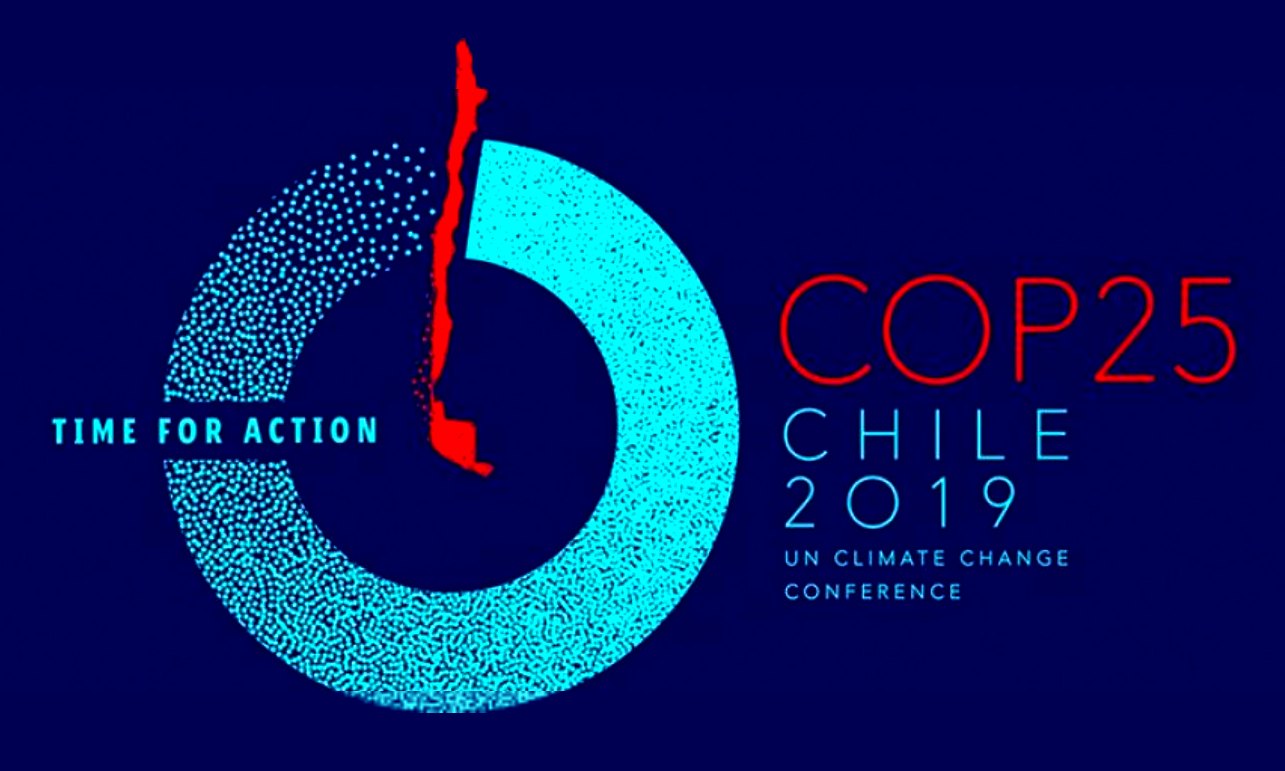
GENERAL INFORMATION
To enter Chile as a tourist you have to take into account the following:
Those from countries with diplomatic relations with Chile
To enter Chile, tourists must check in at International Police by presenting their identification documents (either identity card or passport) and stamped visa (depending on the country of origin).
– Tourists from Argentina, Brazil, Bolivia, Colombia, Ecuador, Uruguay, Paraguay and Peru can enter with their ID cards or equivalent documents.
– The International Police Office provides a duplicate form called "Tourism Card" when entering Chile. This card is personal and non-transferable and its duration is 90 days, extendable for another 90 days. The copy must remain in the tourist's possession for the duration of their stay in the country and must be presented to the International Police upon leaving Chile.
The extension of validity of the Tourism Card is requested in the Immigration Office of the government closest to your place of stay and if you are in the city of Santiago, the Office of Public Assistance of this Department, located on Matucana Street 1223, Santiago.
– To enter Chile as a tourist, you must prove economic solvency.
GRETA
THUNBERG - is a Swedish climate activist. At the COP24
climate talks in Poland, Decembel 2018, Miss Thunberg
addressed the Secretary-General of the United
Nations. She received a standing ovation for one of her
talks. She is behind the global school strike created to call
attention to climate
change. She is a rebel. With a cause. Thunberg is 15 and
autistic and the newest, youngest and most powerful voice on
the world stage demanding the world address global
warming. Go Greta!
WILL
THERE HAVE BEEN ANY REAL AND MEASURABLE PROGRESS IN 2019 ?
That
is the burning question. We owe it to our children to put the
brakes on the uncontrolled use of fossil
fuels. All over the world schools
are experiencing strike action in protest at the inaction of
the United
Nations members to get their act together. We need to turn
the ship and we have a very small rudder. When the captain of
the Titanic
spotted the iceberg that sank the White Star Line's most
famous ship, he tried to avoid the giant floating ice cube by
putting the rudder hard over and reversing the
propellers, but
the ship could not turn in time to avoid a collision.
Where
Greta
Thunberg sent the United
Nations a clear message in December 2018, how much
progress will have been made by the Parties. Wil we have a
bigger rudder than the Titanic,
or will planet earth crash and burn. Since the inception of
the COP talks, there has been very little action and a lot of
hot air.
All
the while we have playground bullies like Donald
Trump and Vladimir
Putin, the world is in danger. Russia
and the USA need to grow up and stop beating up the countries
that cannot afford to defend themselves. Climate
Criminals like these two super powers need to look long
and hard at China,
where they use coal
for energy, but have agreed to a call to action and are
building solar and wind farms like there is no tomorrow.
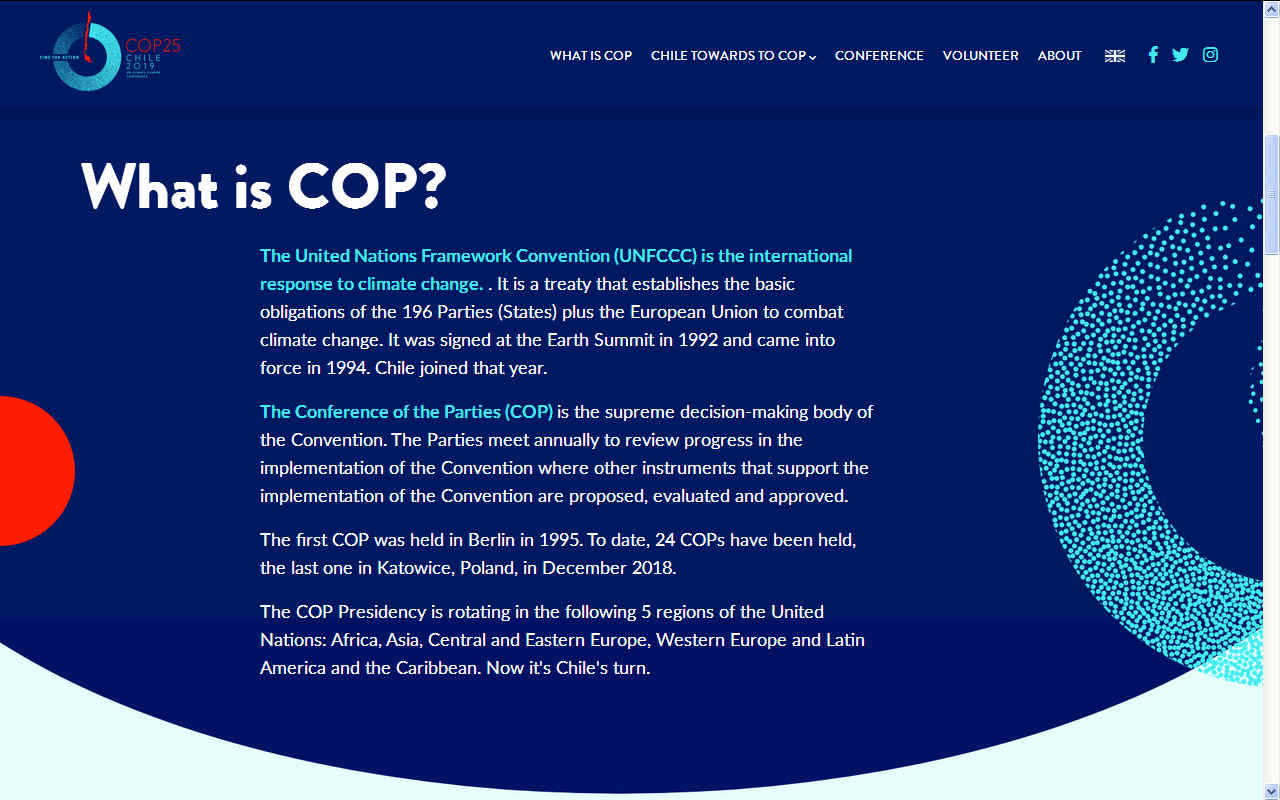
WHAT
IS COP ?
- The United Nations Framework Convention (UNFCCC) is the international response to climate change. . It is a treaty that establishes the basic obligations of the 196 Parties (States) plus the European Union to combat climate change. It was signed at the Earth Summit in 1992 and came into force in 1994. Chile joined that year.
The Conference of the Parties (COP) is the supreme decision-making body of the Convention. The Parties meet annually to review progress in the implementation of the Convention where other instruments that support the implementation of the Convention are proposed, evaluated and approved.
The first COP was held in Berlin in 1995. To date, 24 COPs have been held, the last one in Katowice, Poland, in December 2018.
The COP Presidency is rotating in the following 5 regions of the United Nations: Africa, Asia, Central and Eastern Europe, Western Europe and Latin America and the Caribbean. Now it's Chile's turn.
WHY CHILE
?
Chile is responsible for only 0.25% of global emissions, however,
their country is very vulnerable to climate change. They comply with 7 of the 9 conditions of vulnerability, which places
them among the ten countries most affected by this phenomenon, according to the report of the Global Climate Risk Index 2017, presented by Germanwatch at COP22.
Conditions of vulnerability that Chile presents:
1. Low coastal areas
2. Forest areas exposed to forest deterioration
3. Areas prone to natural disasters
4. Areas exposed to drought and desertification
5. Areas of high urban atmospheric pollution
6. To have zones of mountainous ecosystems
7. To be a country whose economy depends to a great extent on the income generated by the production, processing and export of
fossil fuels and associated products of intensive energy, or their consumption.
The only two criterias that Chile doesn’t have are: being an island or a landlocked country and countries of transit.
On the other hand,
they have 8 years of a great drought that has affected 70% of
their population; serious forest fires consuming more than 500 thousand hectares and destroying 17% of
their native forest; Shocking floods have devastated entire cities such as Chañaral; Hailstorms in summer have strongly impacted the production of fruits such as blueberries, cherries, kiwis and table grapes in the sixth and seventh regions.
This reality does not admit double interpretation. Only a more determined climate action can change
their destiny. Chile is a world reference for the seriousness and responsibility with which it assumes the commitments acquired.
In the last COP24,
they delivered their 3rd Biennial Update Report on Climate Change that contains all
their emissions inventory from 1990 to 2016. They were the first developing country to deliver this report and also to do so in the corresponding year (2018).
The presentation of this Report will allow
them to not only to evaluate the effectiveness of the measures taken, but also is a fundamental pillar to define future climate change policies. This report is a clear and forceful reflection of Chile's commitment in terms of
transparency and management of its emissions to move towards emissions neutrality,
a key to sustainable
development.
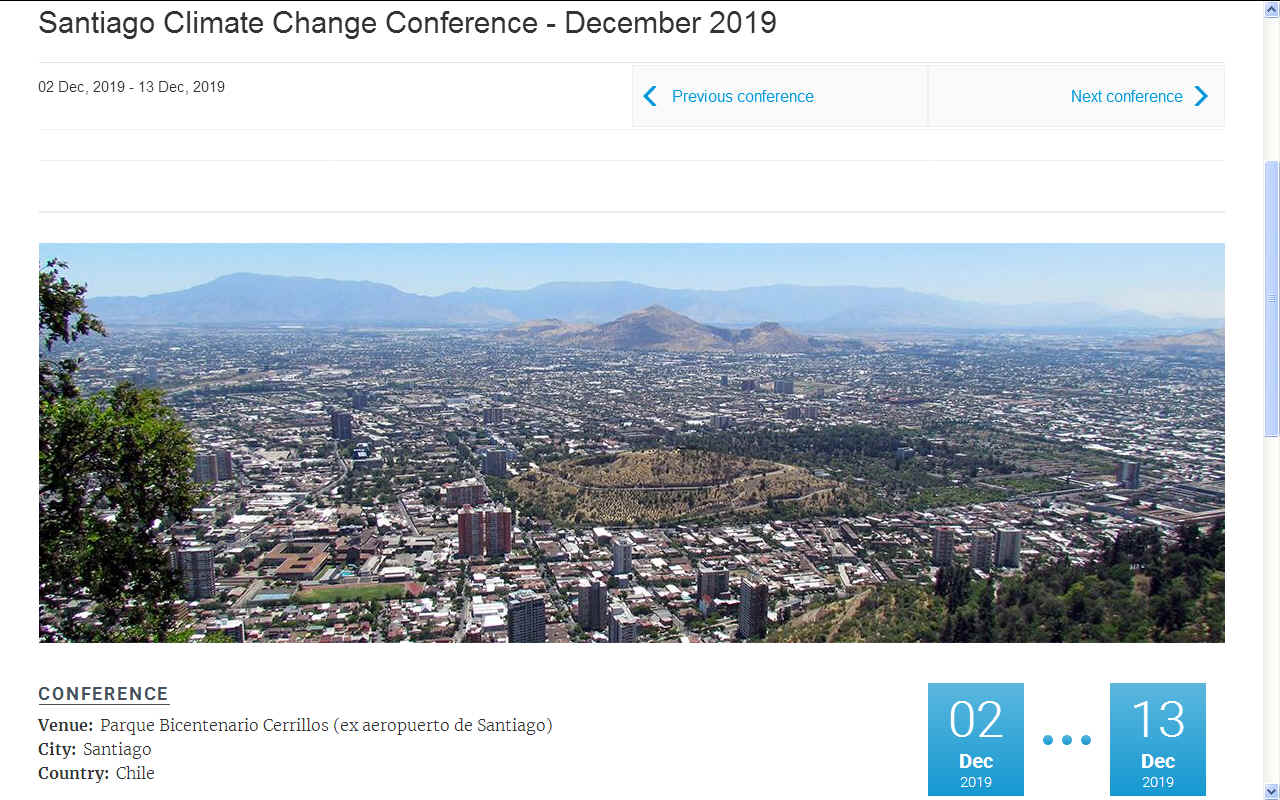
Highlights of
their report:
1) In 2016, the balance of the Forestry sector captured 65 million tCO2eq, increasing its sink status (GHG collector) by 30.8% since 1990, but decreasing it by 8.9% since 2013 (mainly due to
fires forestry).
2) Countries belonging to the OECD have an average of 9.2 tons of CO2 per person, while the global average of CO2 emissions per person is 4.4 tons. We see that the greater the development, the greater the GHG emissions. Our country surpasses that figure by very little, with 4.7 tons of CO2 per person. Therefore, we must strive to decouple, on the one hand, development, and on the other, the emission of greenhouse gases. That is our goal.
3) Regarding the intensity indicators of
greenhouse gas emissions by gross domestic product, this was 0.93 tons of CO2 equivalent, decreasing by 10% since 2007.
The reduction of Chile's emissions indicator shows that the country has been able to generate growth without necessarily increasing its emissions equally. This reinforces the conviction of the government of President Piñera, that there is no real development, if this is not sustainable.
Between 2014 and 2018 we doubled the generation with renewable energies from 10% to 20%, fulfilling in advance the goal of generation with unconventional energies from 20% to 2025. The goal to the year 2050 is to have 70% of clean generation.
Chile firmly believes that the scientific approach is key to further progress and that accurate and
transparent data is essential to achieve effective climate action.
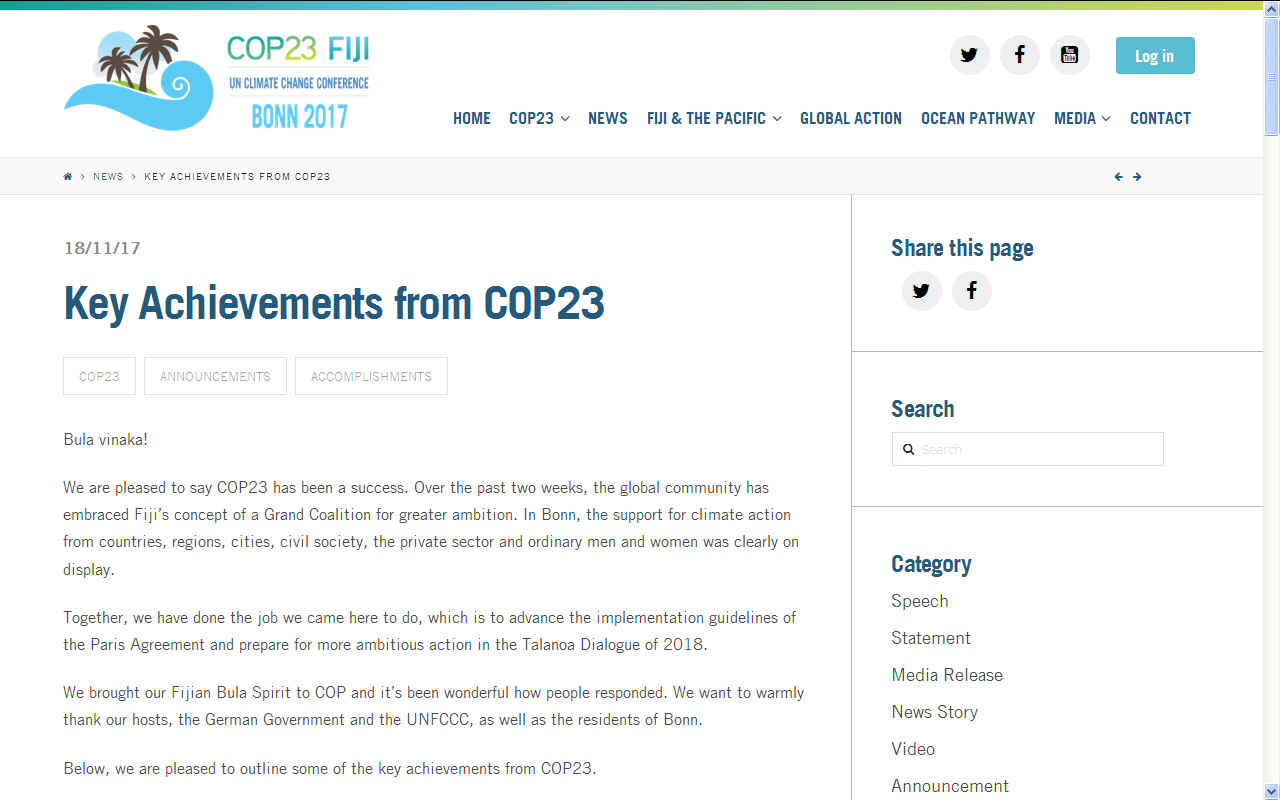
1995 COP
1,
BERLIN, GERMANY
1996 COP
2, GENEVA, SWITZERLAND
1997 COP
3, KYOTO, JAPAN
1998 COP
4, BUENOS AIRES, ARGENTINA
1999 COP
5, BONN, GERMANY
2000:COP
6, THE HAGUE, NETHERLANDS
2001 COP
7, MARRAKECH, MOROCCO
2002 COP
8, NEW DELHI, INDIA
2003 COP
9, MILAN, ITALY
2004 COP
10, BUENOS AIRES, ARGENTINA
2005 COP
11/CMP 1, MONTREAL, CANADA
2006 COP
12/CMP 2, NAIROBI, KENYA
2007 COP
13/CMP 3, BALI, INDONESIA
2008 COP
14/CMP 4, POZNAN, POLAND
2009
COP 15/CMP 5, COPENHAGEN, DENMARK
2010 COP
16/CMP 6, CANCUN, MEXICO
2011 COP
17/CMP 7, DURBAN, SOUTH AFRICA
2012 COP
18/CMP 8, DOHA, QATAR
2013 COP
19/CMP 9, WARSAW, POLAND
2014 COP
20/CMP 10, LIMA, PERU
2015 COP
21/CMP 11, Paris, France
2016 COP
22/CMP 12/CMA 1, Marrakech, Morocco
2017 COP
23/CMP 13/CMA 2, Bonn, Germany
2018 COP
24/CMP 14/CMA 3, Katowice, Poland
2019 COP
25/CMP 15/CMA 4, Santiago, Chile
2020
COP 26/CMP 16/ CMA 5, Glasgow, Scotland
2021
COP 26/Glasgow, Scotland
2022
CP27/ Sharm El-Sheikh, Egypt
UN
CLIMATE ACTION PORTFOLIOS
1.
Finance
2. Energy
Transition
3. Industry
Transition
4. Nature-Based
Solutions
5. Cities
and Local Action
6. Resilience
and Adaptation
7. Mitigation
Strategy
8. Youth
Engagement & Public Mobilization
9. Social
and Political Drivers
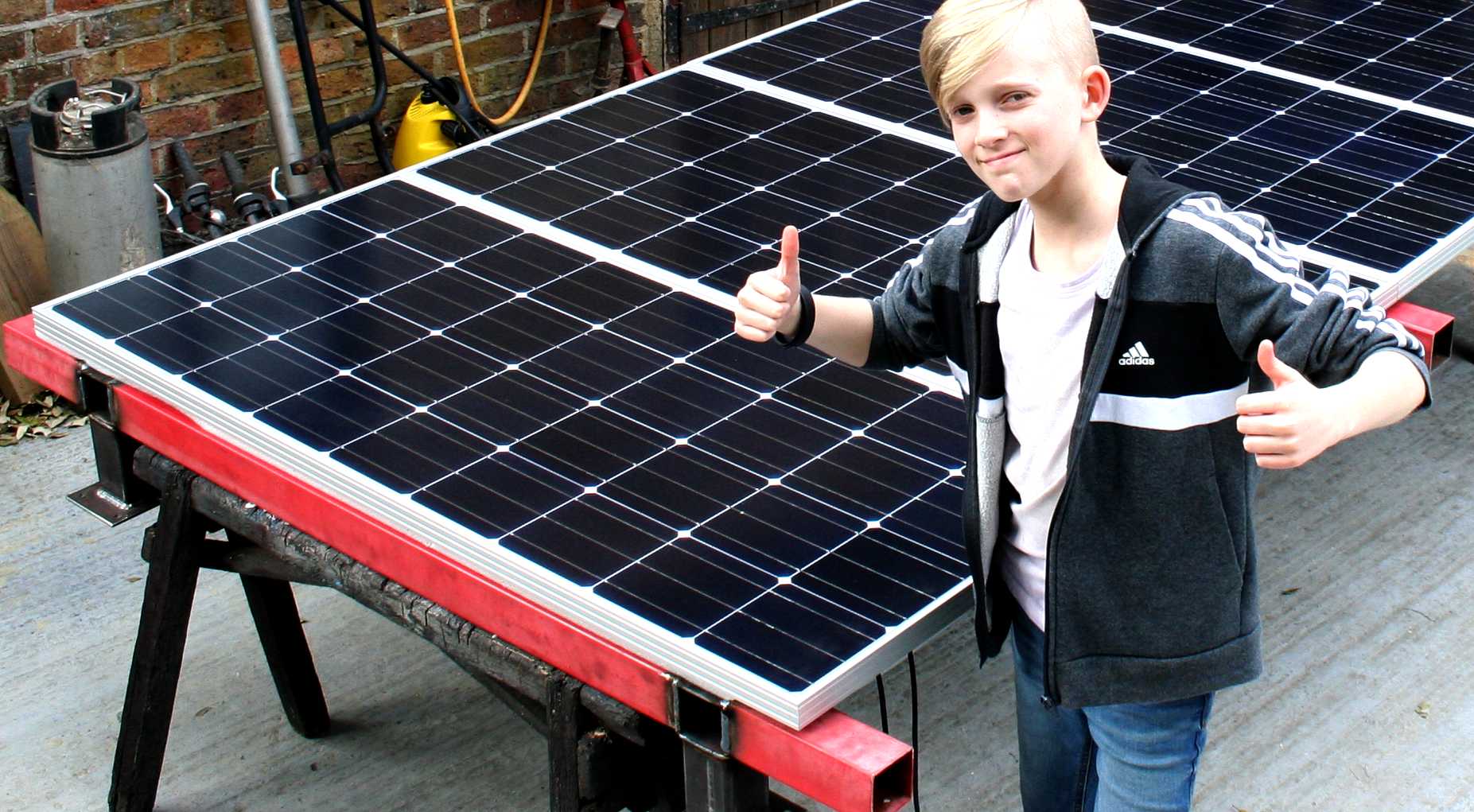
SOLAR
POWERED - Doing our bit to combat climate
change, we
are building an experimental rig aiming to put a larger
version of the same concept on a coastal
version of SeaVax from 2020 (subject to funding). The rig
above is to be fitted to a Ford Transit
roof in May of 2019 so that the experiment can be moved to
other weather locations. This is another step in the direction
of zero carbon shipping. Our experimental rig will
track the sun and move arrays on either side of these fixed
panels to increase the harvestable light energy. Copyright photograph ©
22-04-19 Cleaner
Ocean Foundation Ltd, all rights
reserved.
CONTACTS
The
UNFCCC secretariat is located at two different locations.
Email: secretariat@unfccc.int
www: https://unfccc.int/calendar
https://unfccc.int/santiago
Main
office
UNFCCC secretariat
UN Campus
Platz der Vereinten Nationen 1
53113 Bonn
Germany
Haus Carstanjen Office
Martin-Luther-King-Strasse 8
53175 Bonn
Germany
Mailing address
UNFCCC secretariat
P.O. Box 260124
D-53153 Bonn
Germany
Phone: (49-228) 815-1000
Fax: (49-228) 815-1999
Web: http://unfccc.int
info@climateactionprogramme.org
http://www.climateactionprogramme.org
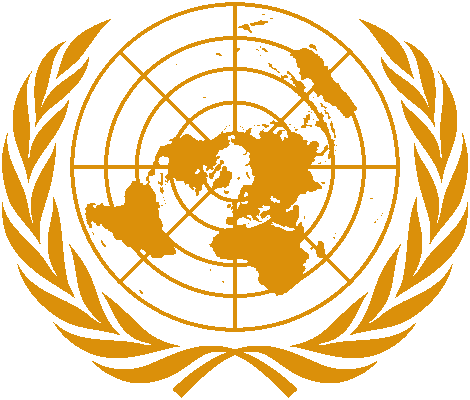
LINKS
& REFERENCE
https://www.breitbart.com/national-security/2019/10/23/chile-evangelical-leaders-call-for-prayer-to-end-leftist-riots/
https://unfccc.int/news/chile-receives-offer-from-spain-to-hold-cop25-in-madrid-from-2-to-13-december-2019
https://unfccc.int/COP25
https://www.businessgreen.com/bg/news/3068228/uk-formally-bids-to-host-cop26-in-2020
DESERTIFICATION
COP HISTORY
|
COP
1: Rome, Italy, 29
Sept to 10 Oct 1997
|
COP
9: Buenos Aires, Argentina, 21 Sept to 2 Oct 2009
|
|
COP
2: Dakar, Senegal, 30 Nov to 11 Dec 1998
|
COP
10: Changwon, South Korea, 10 to 20 Oct 2011
|
|
COP
3: Recife, Brazil, 15 to 26 Nov 1999
|
COP
11: Windhoek, Namibia, 16 to 27 Sept 2013
|
|
COP
4: Bonn, Germany, 11 to 22 Dec 2000
|
COP
12: Ankara, Turkey, 12 to 23 Oct 2015
|
|
COP
5: Geneva, Switzerland, 1 to 12 Oct 2001
|
COP
13: Ordos City, China, 6 to 16 Sept 2017
|
|
COP
6: Havana, Cuba, 25 August to 5 Sept 2003
|
COP
14: New Delhi, India, 2 to 13 Sept 2019
|
|
COP
7: Nairobi, Kenya, 17 to 28 Oct 2005
|
COP
15: 2020
|
|
COP
8: Madrid, Spain, 3 to 14 Sept 2007
|
COP
16: 2021
|
BIODIVERSITY
COP HISTORY
|
COP
1: 1994 Nassau,
Bahamas, Nov & Dec
|
COP
8: 2006 Curitiba, Brazil, 8 Mar
|
|
COP
2: 1995 Jakarta, Indonesia, Nov
|
COP
9: 2008 Bonn, Germany, May
|
|
COP
3: 1996 Buenos Aires, Argentina, Nov
|
COP
10: 2010 Nagoya, Japan, Oct
|
|
COP
4: 1998 Bratislava, Slovakia, May
|
COP
11: 2012 Hyderabad, India
|
|
EXCOP:
1999 Cartagena, Colombia, Feb
|
COP
12: 2014 Pyeongchang, Republic of Korea, Oct
|
|
COP
5: 2000 Nairobi, Kenya, May
|
COP
13: 2016 Cancun, Mexico, 2 to 17 Dec
|
|
COP
6: 2002 The Hague, Netherlands, April
|
COP
14: 2018 Sharm El-Sheikh, Egypt, 17 to 29 Nov
|
|
COP
7: 2004 Kuala Lumpur, Malaysia, Feb
|
COP
15: 2020 Kunming, Yunnan, China
|
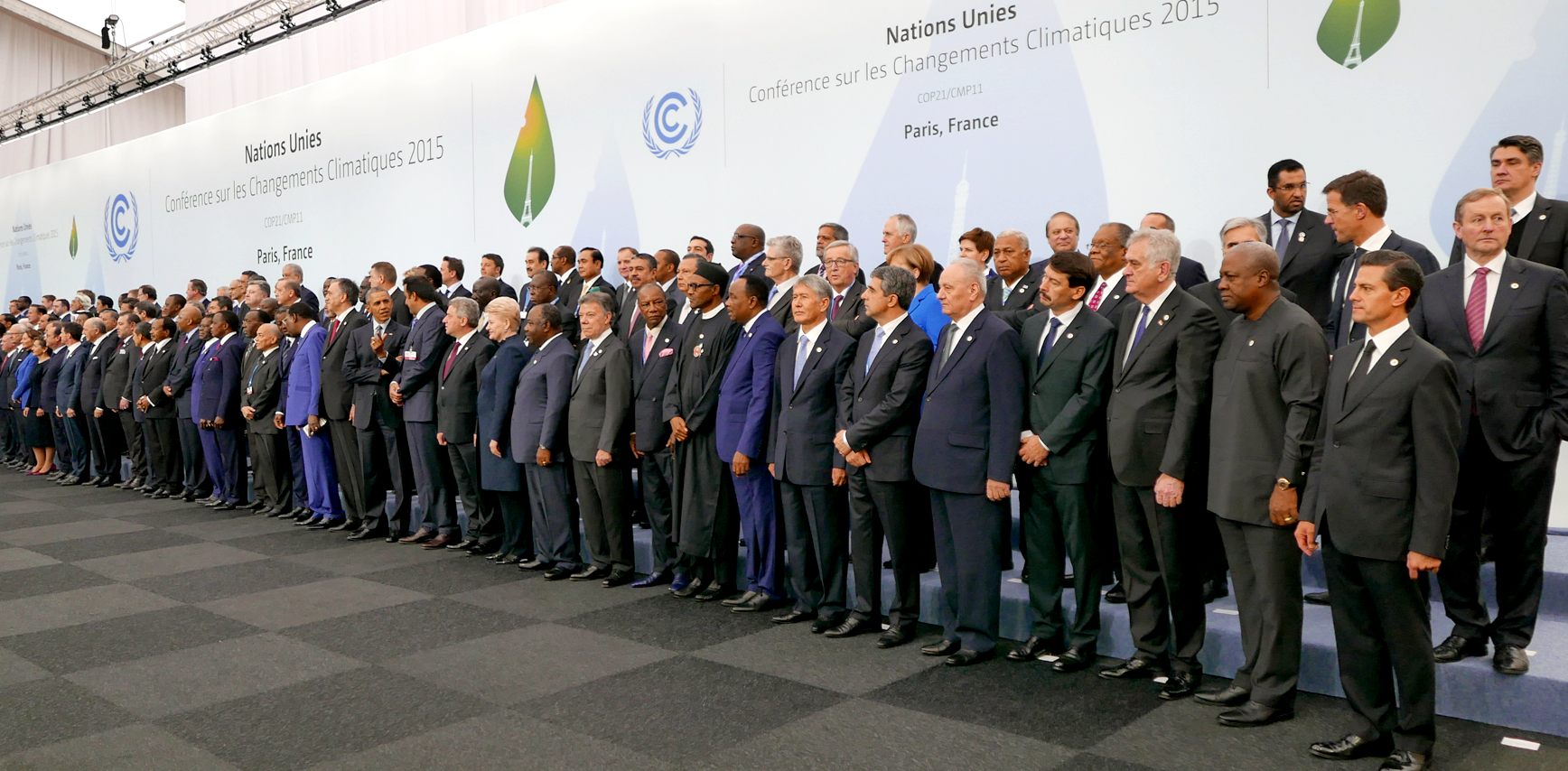
COP
THAT - The United Nations Climate Change Conferences are yearly conferences held in the framework of the United Nations Framework Convention on Climate Change
(UNFCCC). They serve as the formal meeting of the UNFCCC Parties (Conference of the Parties, COP) to assess progress in dealing with climate change, and beginning in the mid-1990s, to negotiate the Kyoto Protocol to establish legally binding obligations for developed countries to reduce their greenhouse gas emissions. From 2005 the Conferences have also served as the "Conference of the Parties Serving as the Meeting of Parties to the
Kyoto
Protocol" (CMP); also parties to the Convention that are not parties to the Protocol can participate in Protocol-related meetings as observers. From 2011 the meetings have also been used to negotiate the
Paris Agreement as part of the Durban platform activities until its conclusion in 2015, which created a general path towards climate action. The first UN Climate Change Conference was held in 1995 in Berlin.
This
website is provided on a free basis as a public information
service. copyright © Cleaner
Oceans Foundation Ltd (COFL) (Company No: 4674774)
2019. Solar
Studios, BN271RF, United Kingdom.
COFL
is a charity without share capital. The names AmphiMax™,
RiverVax™
and SeaVax™
are trade names used under license by COF in connection with their 'Feed
The World' ocean cleaning sustainability campaign.
|























